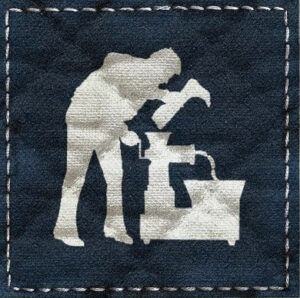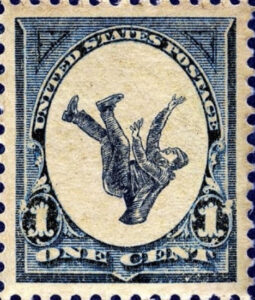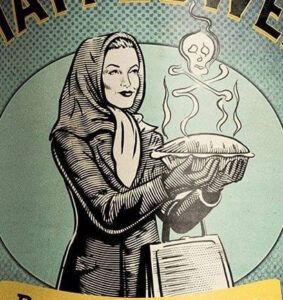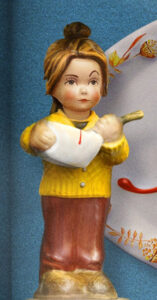Fargo: A retrospective of five stories
With the new season having been on the horizon, I decided to (re)watch almost all of Fargo this January. Yesterday my journey culminated in the phenomenal finale of Season 5, and all I can say is: this TV show is absolutely brilliant (mostly).
But let’s backtrack a little. Fargo is an anthology show in which every season tells an entirely different story (set in the same universe as the 1996 movie). Thus, each season feels vastly different, and there are very notable fluctuations in quality. What unites them are not only certain characters and cameos, but also the overall vibe of really deep, and really interesting, often peculiar characters on all sites of alignment, as well as a slight hint of the unexplainable. I will go over all of the seasons individually and analyze them in terms of plot, characters, the unexplainable, its connections, and give my personal opinion1.
 Season 1 is set in 2006 and primarily tells the story of Lester Nygaard and his journey from a small town salesman into a murderer, triggered by the mysterious and mirthfully mischievous Lorne Malvo. This sets in motion a chain of events introducing us to the incredibly smart but struggling officer Molly Solverson, her ignorant boss ‘Saul Goodman’, her colleague from Duluth Gus Grimly, the deaf guy and his partner from Fargo, and so many more interesting people.
Season 1 is set in 2006 and primarily tells the story of Lester Nygaard and his journey from a small town salesman into a murderer, triggered by the mysterious and mirthfully mischievous Lorne Malvo. This sets in motion a chain of events introducing us to the incredibly smart but struggling officer Molly Solverson, her ignorant boss ‘Saul Goodman’, her colleague from Duluth Gus Grimly, the deaf guy and his partner from Fargo, and so many more interesting people.
Every single character in this season is so incredibly well-written, even down to Molly’s father. And not only that, every single character is portrayed expertly by the actors. While Martin Freeman and Billy Bob Thornton are definitely on top of the cast, even minor characters stand out by their depth and charisma, such as for example Molly’s father, who is portrayed by Keith Carradine.
The season achieves something that many modern writers attempt, but desperately fail to do well: you are engaging with the bad guys beyond just hating them. I think the character that stands out most here is Lorne Malvo (Billy Bob Thornton). He seems thoroughly evil, but watching him is just such a delight. Watching him wreak havoc, and the weirdness, craziness and insanity that comes with it, always kept me engaged. He eventually gets what he deserves, and it’s probably the most satisfying character death in the entire show. The predator is caught in the trap. Licking his wounds, he becomes the prey.
Similarly, Lester Nygaard is a character we are made to empathize with on many levels. He’s been bullied in a very nasty way, he is married to a woman who is genuinely extremely annoying, and he’s struggling with his job. He’s been pushed to the edge, and when Lorne Malvo offers a hand, he pulls him into a descent of increasingly morally dark actions.
While Fargo is a crime show that claims to tell “true” stories2, there’s always a hint of the supernatural in every season, making the constant reminder of it being a true story even more ironic. In season one this is most notably the raining fish incident, which acts as a part of the biblical plagues that come to haunt one of the characters of the season, some of which were the handiwork of Lorne Malvo, but this particular one remains unexplained.
Fargo Season 1 remains one of the most brilliantly told stories I have ever seen on TV. It’s a masterpiece. I first watched it in 2014, and then in 2024, and it still holds up ten years later. It’s really hard to think how one would be able to top this season, and I was fairly skeptical when I heard that there would be more seasons of Fargo, with this turning into an anthology show. Let’s see what the other seasons offer.
 Season 2 is set in 1979 and shows us the events that have been alluded to several times by Molly’s father, Lou Solverson, throughout the first season. In the first season we learn that he’s a retired state trooper, and that he retired after witnessing a series of crazy events culminating in a showdown between rival crime syndicates. Thus, in this season, we follow Lou Solverson, expertly portrayed by Patrick Wilson, who channels the character we already knew from Keith Carradine masterfully (which is something I feel a lot of actors fail at).
Season 2 is set in 1979 and shows us the events that have been alluded to several times by Molly’s father, Lou Solverson, throughout the first season. In the first season we learn that he’s a retired state trooper, and that he retired after witnessing a series of crazy events culminating in a showdown between rival crime syndicates. Thus, in this season, we follow Lou Solverson, expertly portrayed by Patrick Wilson, who channels the character we already knew from Keith Carradine masterfully (which is something I feel a lot of actors fail at).
Once again, this season is full of incredibly interesting and intriguing characters, and the casting is spot-on. Ted Danson plays Lou’s father-in-law and police chief of the local town. Kirsten Dunst plays Peggy Blumquist, who ends up with a Gerhardt in her windshield and just happens to drive home with him, landing her and her husband Ed (Jesse Plemons) in a crime gang war, because that guy in the windshield? He was a member of the local crime syndicate family, a German-descended, overly patriotic family whose patriarch (the guy from Battlestar Galactica) just suffered from a stroke. His wife takes over, all while things continue to get out of hand.
Every single character in this story has so. much. depth. Every single one. And once again, the story revolves within morally ambiguous areas. And once again, we are made to empathize deeply with the “bad guys”. One of the most striking examples for me in this season was how Floyd Gerhart (Jean Smart) cares so lovingly for her husband after he had the stroke. He’s obviously old, but after the stroke he was basically a vegetable, unable to speak or care for himself. We see his wife care for him with so much love and devotion that this was the only time this show actually brought tears to my eyes. And he’s supposed to be the bad guy.
The plot of this season revolves around the Gerhardt’s search for their missing son, and just how all of that happened is so absurd that it’s a delight to watch. There’s certainly a thematic connection of what happened to him back to the Fargo movie. But this side of the story mostly revolved around the naive and aloof Peggy, a housewife and hair stylist who doesn’t seem particularly happy with the state of her life. Well, things definitely changed for me.
Finally, there’s also the crime syndicate from Kansas City, that eventually gets involved here and delivers us a few more interesting characters, namely Mike Milligan and the twins. And while he started out working for the Gerhardts, let’s not forget Hanzee, who eventually becomes a force of nature with his own agenda, and gets the vengeance he probably didn’t know he needed.
This season also has a dash of the unexplainable, supernatural. This is quite obviously the UFO that makes its first blurry appearance in the season premiere, and appears again, undoubtely and wholly an actual flying UFO towards the end of the season. So that happened. All I thought was What The Fuck, but somehow, it just works. I think it works so well because all the characters have the exact same reaction to it. It appears, they all stop and stare at it for a few seconds to think WTF, and then they continue to go about their business (in this case, shooting each other), and it’s never talked about again.
Season 2 is just as solid as Season 1, full of characters that are a joy to watch no matter which side they’re on. Altogether, it wasn’t quite as brilliant as the first season, but it’s definitely a close second.
 Season 3 is set in 2010, and this is when IMHO the show takes a noticeable dip in quality. And full disclaimer: I did not include this season in my recent (re)watch of the show, because I just couldn’t – why, I’ll soon explain. So my review of this season is based on my vague memory of having watched it once in 2017, and a summary I watched on YouTube before writing this.
Season 3 is set in 2010, and this is when IMHO the show takes a noticeable dip in quality. And full disclaimer: I did not include this season in my recent (re)watch of the show, because I just couldn’t – why, I’ll soon explain. So my review of this season is based on my vague memory of having watched it once in 2017, and a summary I watched on YouTube before writing this.
This season falls flat for me because I didn’t engage with its characters on the same level as I did with the characters from the first two seasons. They were not sufficiently interesting for me, they lacked depth, or otherwise were subject to tropes. Honestly, none of the characters in this season were particularly memorable, except of course, for V.M. Varga. But unfortunately, he’s memorable for all the wrong reasons. Because he’s disgusting. David Thewlis is a great actor, but I think the image of him picking out his absolutely freaking disgusting teeth will forever be burned into my mind. Never again.
On the other side, one thing I really enjoyed this season was the little robot. It’s obviously this season’s weird, possibly slightly unexplainable thing, but it was kinda cute and memorable how that little robot always said “I can help!”. Altogether, a season I do not particularly remember very well, and which I would never want to watch again.
 Season 4 is set in 1950 and feels like a history lesson. Unlike Season 3, which didn’t really seem connected much to the first two seasons, Season 4 shows us the story of the birth of Kansas City crime syndicate, or at least I think that’s what it was supposed to be. It shows us a gang war between two rival gangs, one ran by Italian Americans, and one ran by African Americans.
Season 4 is set in 1950 and feels like a history lesson. Unlike Season 3, which didn’t really seem connected much to the first two seasons, Season 4 shows us the story of the birth of Kansas City crime syndicate, or at least I think that’s what it was supposed to be. It shows us a gang war between two rival gangs, one ran by Italian Americans, and one ran by African Americans.
Again, this season falls flat in a lot of ways for me. The characters lack a lot of the depth that I came to expect after Season 1 and 2, and to make things worse, some of them were horribly miscast. Neither Chris Rock, nor Jason Schwartzman are convincing at all as crime bosses, and while in other roles they are great actors, they are overall very detrimental to the quality of this season. I believe with better fitting actors in these roles, it could have been a more solid season, but even the plot is not really quite as engaging as earlier stories in this universe.
The season starts really slow, and I was contemplating giving up on watching it because it just wasn’t engaging at all. It was also notably lacking that signature bizarre-ness that I expected from characters in earlier seasons (like Lorne Malvo, Peggy Blumquist or V.M. Varga). This only very slowly appeared later in the season, once we learn how deranged Oreatta actually is, but she’s just a very small side character and it’s quite a burden for her to carry the whole weight of this season on her shoulders. Another character that became interesting only late in the season was Jack Huston’s character, the OCD-riddled police officer who gets torn at from all sides. I believe those two are the most memorable characters of the entire show, save perhaps Satchel and his dog, who also seems to be the only real connection to the Fargo universe, as he seems to be Mike Milligan from Season 2. Now how did he become the guy we know from Season 2, that’s a story I would be interested to watch.
This season’s villains feel different from those in earlier seasons, because unlike in earlier seasons, they were not really fun to watch (except perhaps Oreatta). On the contrary, watching Gaetano generally made me uncomfortable. While this is OK, it’s a different experience from what I learned to expect from the show, and as we will see, this feeling will come back to haunt us just like that weird zombie ghost.
To summarize, Season 4 is one of the weakest seasons of this show, which is only saved by having a handful of interesting characters who ironically have very little to do with the season’s main plot of a rival gang war.
 Now, Season 5 is set in 2019 and this season is a force of nature. It’s brilliant. I was very skeptical after two very weak seasons. It really took me a few episodes, but as we reach the culmination of this story, I was 100% invested. This is a great story, and while this particular story is not true, it feels like it’s the “truest” story Fargo has ever told.
Now, Season 5 is set in 2019 and this season is a force of nature. It’s brilliant. I was very skeptical after two very weak seasons. It really took me a few episodes, but as we reach the culmination of this story, I was 100% invested. This is a great story, and while this particular story is not true, it feels like it’s the “truest” story Fargo has ever told.
There’s only one problem: it feels to be very removed from the universe of Fargo. There are no obvious connections to anything that ever happened in any of the other seasons, it’s not about crime syndicates or wandering men who want to watch the world burn3.
It’s just the story of an ordinary woman fighting for her freedom from her abusive psychopath of an alt-right ex-husband. It tells the story of Dorothy ‘Dot’, who made herself a nice and comfortable life with a lovingly innocent husband and a smart daughter. But she has a suffered greatly in the past, having been forced to marry the absolutely horrible “I am the law” kind of sheriff Roy Tillmann (at the age of 17, no less). Wow, this character is the kind of villain that the longer you watch, the more disgusted and horrified you are by him. Jon Hamm brings him to life in a way that gives me nightmares.
Tillman is the kind of man no woman in her right mind ever, ever, wants to be around. He treats woman as a possession, and they are not allowed to have a voice or opinion. If they do something that he slightly disagrees with, he hits them or puts them in their place in whatever other unimaginable cruel way he can think of. And to make things worse, he’s a sheriff and he thinks he’s above the law. He kills and commits crime without consequences, because obviously he’s the law. How do you even deal with that? That’s also what the other law-enforcement people of this season have to deal with, such as the two FBI agents, the state trooper, and of course Indira. Honestly, while these were mostly good characters, they weren’t great – not in the same way as we saw in the first two seasons.
Tillman is the kind of crazy conservative American that we here in Europe only ever hear stories about. Right wing Trump voters, religious zealots and the like. He even has a ranch and his own private militia, just to check off all the stereotypes. He’s scary because he feels so real. I’m fairly certain there are actually people like him somewhere in the remote regions of North Dakota or wherever else in the US. It’s hilarious how all those alt-right YouTubers are sulky about how this season “ruined” their favorite show with “wokeness” and socialism or whatever. There is nothing woke about this season. It just holds them up a mirror to show them how disgusting they are. It’s genuinely a great story of a woman who fought very hard and suffered unimaginable atrocities to get to where she is – which is not even in a particularly ‘powerful’ position, but just in a loving home with a loving family and a loving and respectful husband.
The season has a host of other characters that are interesting in some way or another. Tillman’s son Gator for example is a character for whom I have had an array of different emotions. Mostly hate and disgust, since he is introduced as part of his father’s entourage of right-wing fanatics. But throughout the show, we see that he’s just as much a victim of his father as everyone else, and all he ever wanted was to be good enough. But Tillman is the kind of narcissistic father who cannot love, and for whom no child (or woman for that matter) will ever be good enough. I did develop some empathy for Gator later in the season, and I think he didn’t really deserve what he got – which brings me to this season’s strangest, most inexplicable aspect, the character of Ole Munch.
Ole Munch not only looks very strange with his skirt, boots and 1700s haircut. While in the first episode he just appears to be an odd mercenary, this character becomes a lot more interesting after he hits his head. It’s implied that he is either an immortal who is hundreds of years old, or that he’s channeling his ancestors through some kind of delusion. In a flashback to the 1500s, we see him or his ancestor taking part in the custom of “sin eating”. He is certainly a character that invokes fear, similar to Tillman, but in a much more primal way. His actions seem random at times, oscillating between murdering and helping. But he seems to live by his own code, and perhaps takes “eye for an eye” a bit too literal. What a strange, strange character, and I say this after having watched five seasons of a TV show full of strange characters – Ole Munch is perhaps the strangest of them all.
I love what happened to him in the finale though. That was a surprise which I didn’t really expect, in it’s done in such a clever way. After the events of the finale some time passes, and he shows up in Dorothy’s house to collect his debt, eye for an eye. However, the way the characters treat him, especially Wayne, juxtaposes his incredibly otherworldly seriousness with Wayne’s joyful innocence in such a way that Ole is completely disarmed. And how Dorothy talks to him at the kitchen table… his whole world is turned upside down by a kindness he’s probably never experienced in his life, and eventually Dorothy absolves him of all the sins he’s carrying by offering him a piece of bread, made with love. Wow. It’s one example of the religious symbolism that can be found not only in this episode, but throughout the show, but it’s always done very subtly and with a hint of the comedic, ironic or absurd.
Season 5 is one of the more memorable stories I’ve experienced, and it surpassed my expectations. So how do the seasons compare? In my opinion, Season 1 is still the best, followed by Season 2, Season 5, and then eventually Season 4 and Season 3. All have something going for them, and all are really great stories filled to the brim with some of the most interesting, intriguing characters I’ve ever seen on the screen. It will definitely go on my list of shows to rewatch, should I run out of quality content, and I can highly recommend this show if you’re looking for something that makes you think and feel while being entertained.


Write a response